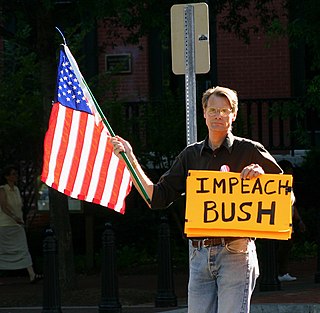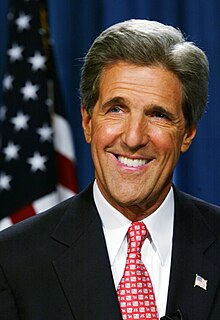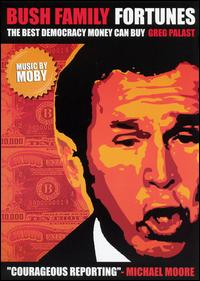
The 2000 United States presidential election was the 54th quadrennial presidential election. It was held on Tuesday, November 7, 2000. Republican candidate George W. Bush, the Governor of Texas and the eldest son of the 41st President George H. W. Bush, won the election by defeating Democratic nominee Al Gore, the incumbent vice president. It was the fourth of five presidential elections in which the winning candidate lost the popular vote, and is considered one of the closest elections in US history.

The 2004 Republican presidential primaries were the selection process by which voters of the Republican Party chose its nominee for President of the United States in the 2004 U.S. presidential election. Incumbent President George W. Bush was again selected as the nominee through a series of primary elections and caucuses culminating in the 2004 Republican National Convention held from August 30 to September 2, 2004, in New York City.

The 2004 United States presidential election, the 55th quadrennial presidential election, was held on Tuesday, November 2, 2004. Incumbent Republican President George W. Bush defeated Democratic nominee John Kerry, a United States Senator from Massachusetts.

During the presidency of George W. Bush, several American politicians sought to either investigate Bush for possibly impeachable offenses, or to bring actual impeachment charges on the floor of the United States House of Representatives Judiciary Committee. The most significant of these efforts occurred on June 10, 2008, when Congressman Dennis Kucinich, along with co-sponsor Robert Wexler, introduced 35 articles of impeachment against Bush to the U.S. House of Representatives. The House voted 251 to 166 to refer the impeachment resolution to the Judiciary Committee on June 11, where no further action was taken on it. Bush's presidency ended on January 20, 2009, with the completion of his second term in office, rendering impeachment efforts moot.

The 2004 United States presidential election in Vermont took place on November 2, 2004, and was part of the 2004 United States presidential election. Voters chose 3 representatives, or electors to the Electoral College, who voted for president and vice president.
This bibliography of George W. Bush is a list of published works, both books and films, about George W. Bush, 43rd President of the United States.

George Walker Bush is an American politician and businessman who served as the 43rd president of the United States from 2001 to 2009. He had previously served as the 46th governor of Texas from 1995 to 2000.

The 2004 United States presidential election in New Mexico took place on November 2, 2004, and was part of the 2004 United States presidential election. Voters chose 5 representatives, or electors to the Electoral College, who voted for president and vice president.

The 2000 United States presidential election in Florida took place on November 7, 2000, as part of the nationwide presidential election. Florida, a swing state, had a major recount dispute that took center stage in the election. The outcome of the 2000 United States presidential election was not known for more than a month after balloting because of the extended process of counting and recounting Florida's presidential ballots. State results tallied on election night gave 246 electoral votes to Republican nominee Texas Governor George W. Bush and 255 to Democratic nominee Vice President Al Gore, with New Mexico (5), Oregon (7), and Florida (25) too close to call that evening. Gore won New Mexico and Oregon over the following few days, but the result in Florida would have been decisive however those two states had voted.

The 2004 United States presidential election in South Carolina took place on November 2, 2004, as part of the 2004 United States presidential election which took place throughout all 50 states and D.C. Voters chose eight representatives, or electors to the Electoral College, who voted for president and vice president.

The 2004 United States presidential election in West Virginia took place on November 2, 2004, and was part of the 2004 United States presidential election. Voters chose 5 representatives, or electors to the Electoral College, who voted for president and vice president.

The 2000 Republican presidential primaries were the selection process by which voters of the Republican Party chose its nominee for President of the United States in the 2000 U.S. presidential election. Texas Governor George W. Bush was selected as the nominee through a series of primary elections and caucuses culminating in the 2000 Republican National Convention held from July 31 to August 3, 2000, in Philadelphia, Pennsylvania.
Bush v. Palm Beach County Canvassing Board, 531 U.S. 70 (2000), was a United States Supreme Court decision involving Florida voters during the 2000 presidential election. In this case, the U.S. Supreme Court requested clarification from the Florida Supreme Court regarding a decision it had made. Shortly after the Florida Supreme Court provided those clarifications, the U.S. Supreme Court resolved the election in favor of George W. Bush over Al Gore in the case of Bush v. Gore.

Decision Points is a memoir by former U.S. President George W. Bush. It was released on November 9, 2010, and the release was accompanied by national television appearances and a national tour. The book surpassed sales of two million copies less than two months after its release, breaking the record previously held by former President Bill Clinton's memoir My Life. Decision Points also opened at #1 on the New York Times bestseller list.

Bush Family Fortunes: The Best Democracy Money Can Buy is a 2004 documentary film directed by Steven Grandison and Greg Palast. The film, which examines various aspects of the Presidency of George W. Bush, including the 2000 US Presidential election and the Iraq War, is adapted from the 2003 BBC production Bush Family Fortunes and based on the 2002 book The Best Democracy Money Can Buy by investigative journalist Palast, who had spent years tracking the Bush family for the BBC and The Guardian newspaper. The research for the original BBC film, which claims to have exposed the George W. Bush military service controversy, was also drawn upon by Michael Moore for Fahrenheit 9/11 (2004) and footage was used by Robert Greenwald in Unprecedented: The 2000 Presidential Election (2002).

There have been five United States presidential elections in which the winner lost the popular vote including the 1824 election, which was the first U.S. presidential election where the popular vote was recorded. Losing the popular vote means securing less of the national popular vote than the person who received either a majority or a plurality of the vote.

The 2016 United States presidential election in Vermont was held on November 8, 2016, as part of the 2016 United States presidential election in which all 50 states plus The District of Columbia participated. Vermont voters chose three electors to represent them in the Electoral College via a popular vote pitting the Republican Party's nominee, businessman Donald Trump, and running mate Indiana Governor Mike Pence against Democratic Party nominee, former Secretary of State Hillary Clinton and her running mate, Virginia Senator Tim Kaine, and Independent write-in candidate, Vermont Senator Bernie Sanders.













